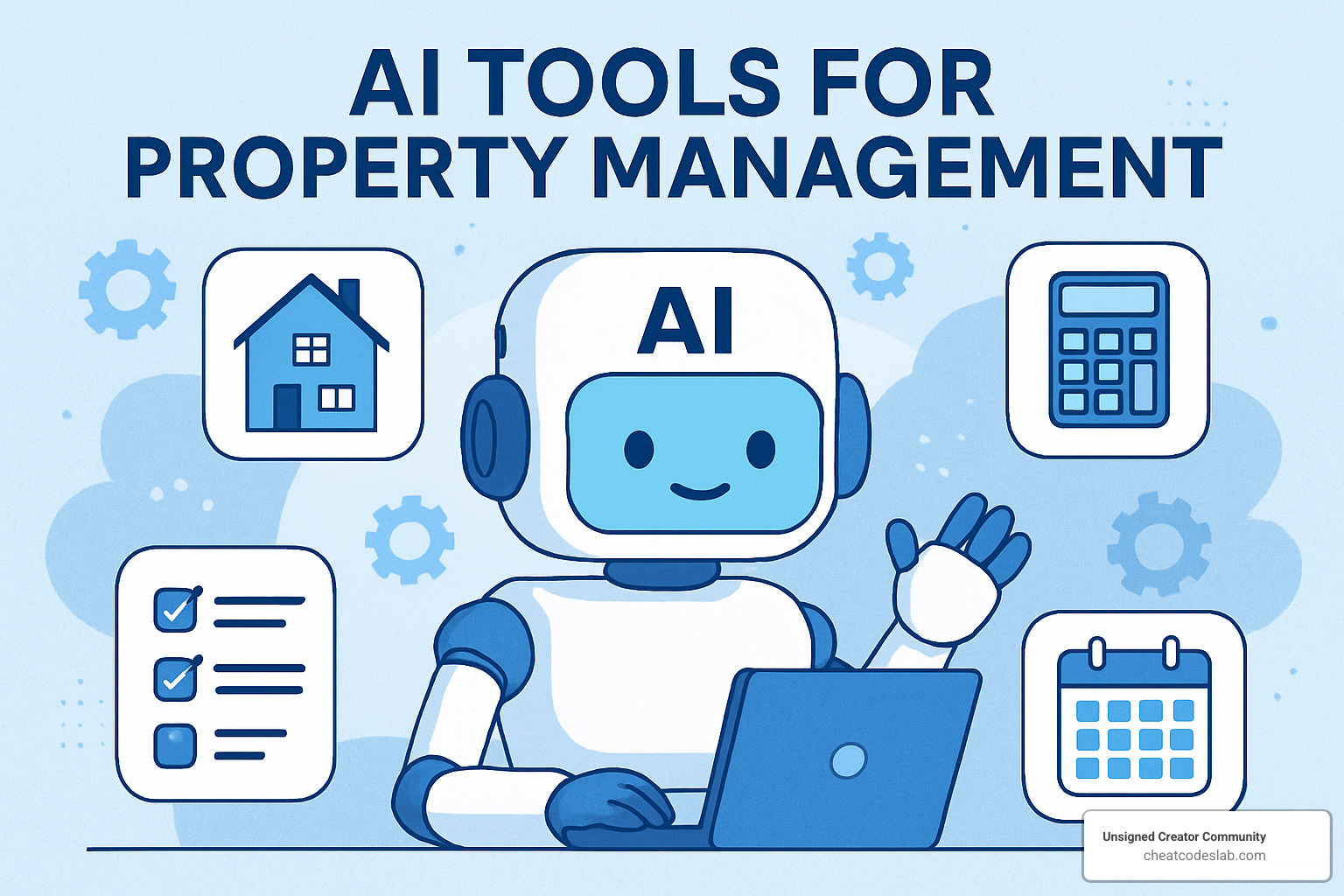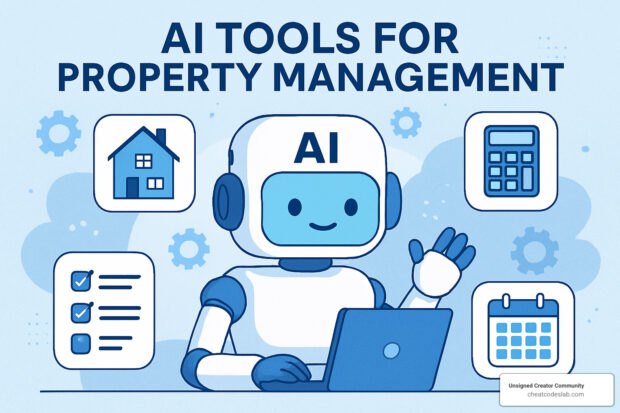
AI Tools for Property Management: 7 Powerful Ways to Boost Success 2025
The Future of Real Estate Operations: AI Tools Changing Property Management
AI tools for property management are revolutionizing how real estate professionals manage properties, communicate with tenants, and optimize operations. Here’s a quick overview of the top AI applications in property management:
- Leasing Automation – AI chatbots that respond to inquiries 24/7 and schedule tours
- Tenant Screening – Automated background checks and risk assessment
- Predictive Maintenance – AI systems that detect potential equipment failures before they happen
- Energy Management – Smart systems that optimize utility usage and costs
- Accounting Automation – Automated bookkeeping, rent collection, and financial reporting
- Virtual Assistants – 24/7 resident support and communication
Property management has traditionally been a high-touch, labor-intensive industry with a turnover rate of 32.7%—significantly higher than the 22% average across all industries. The demands of 24/7 availability, rapid response times, and complex administrative tasks have made it ripe for AI change.
According to recent data, responding to rental inquiries within the first 1-2 minutes leads to a 40% chance of prospect engagement, while waiting just 30 minutes drops that likelihood to a mere 10%. This highlights why AI tools are becoming essential rather than optional for competitive property managers.
Studies show that 80% of property management professionals believe accounting reports should be automated, and 75% want to automate tasks like auditing, financial diagnostics, utility billing, and bill entry. The right AI solutions can deliver these efficiencies while improving tenant satisfaction.
I’m digitaljeff, a tech entrepreneur who has spent the last decade helping businesses implement AI solutions including AI tools for property management that streamline operations and improve tenant experiences.

AI tools for property management word guide:
– AI tools for CRM
– AI tools for analytics
– AI tools for customer service
AI Tools for Property Management: Benefits & Key Applications
The property management world is experiencing a revolution, and artificial intelligence is leading the charge. These aren’t just fancy tech tools—they’re game-changers that are making property managers’ lives easier while boosting their bottom line.

Let’s explore how AI tools for property management are changing every aspect of the business:
AI Tools for Property Management: Leasing & Lead Management
Remember the days of playing phone tag with potential tenants? Those days are over. Today’s AI leasing assistants are like having your best leasing agent working 24/7 without ever needing a coffee break.
These digital helpers respond to inquiries instantly, schedule property tours while you sleep, and even send personalized follow-ups based on what each prospect is looking for. When a lead isn’t a good fit for one property, the AI smoothly suggests another in your portfolio that might be perfect.
The numbers tell the story: responding within 2 minutes gives you a 40% chance of engaging that prospect, but wait half an hour and your chances plummet to 10%. No wonder property managers are embracing these tools!

Real-world results are impressive—some AI assistants handle over 1.5 million conversations annually, automating 90% of prospect interactions. This frees up your human team to do what they do best: building relationships and closing deals.
Smarter Tenant Screening with AI Tools for Property Management
Finding great tenants is part art, part science—and now, part AI. Modern screening tools powered by artificial intelligence dig deeper than traditional background checks, accessing over 200,000 records across more than 200 countries.
What’s particularly valuable is how these tools help reduce human bias in the screening process. By applying consistent criteria to every applicant, AI tools for property management help ensure Fair Housing compliance while still providing thorough evaluations.
The efficiency gains are remarkable. What used to take hours of calling references and verifying documents now happens in minutes. Plus, the machine learning models can spot concerning patterns that human screeners might miss, helping you make more informed decisions about who gets the keys to your properties.
According to HUD’s Fair Housing guidelines, consistent application of screening criteria is essential for compliance—making AI a valuable ally in navigating these regulations while protecting your investment.
Predictive Maintenance & Work Order Automation
This might be the most exciting frontier in property management AI. Imagine knowing that a water heater is about to fail before your tenant wakes up to a cold shower. That’s the magic of predictive maintenance.
By combining IoT sensors with smart algorithms, AI tools for property management can detect subtle changes in equipment performance that signal potential problems. When issues are detected, the system automatically creates work orders, selects the right contractor based on their expertise and availability, and keeps everyone in the loop.

The savings are substantial—smart thermostats alone can cut heating bills by 10-12% while extending equipment life. More comprehensive systems monitoring HVAC, plumbing, and electrical components can slash emergency repairs by up to 75%.
These AI tools for customer service can even guide tenants through simple fixes (“Have you tried resetting the breaker?”) or dispatch the right technician when needed. Problems get solved faster, tenants stay happier, and your maintenance costs become more predictable.
Accounting, Fraud Detection & Reporting
Let’s be honest—most property managers didn’t get into the business because they love accounting. Fortunately, AI tools for property management are taking over the number-crunching.
These intelligent systems categorize transactions, reconcile accounts, and generate reports with minimal human input. They’re also surprisingly good at spotting potential fraud, flagging unusual patterns that might indicate something fishy is happening with your finances.
According to industry surveys, 80% of property managers want automated accounting reports, and 75% are eager to automate tasks like auditing and utility billing. AI delivers on these wishes while adding an extra layer of financial security.
| Task | Manual Process | AI-Powered Process |
|---|---|---|
| Transaction categorization | 2-3 minutes per transaction | <1 second per transaction |
| Monthly reconciliation | 4-8 hours | 15-30 minutes |
| Fraud detection | Limited to obvious discrepancies | Identifies subtle patterns and anomalies |
| Report generation | 2-3 hours | Instant, on-demand |
| Budget forecasting | Based on limited variables | Incorporates hundreds of data points |
Market Analysis & Dynamic Pricing
Setting the right rent price used to be more art than science. Now, AI tools for property management are bringing scientific precision to pricing strategy.
These sophisticated systems analyze comparable properties, market trends, location factors, and dozens of other variables to suggest optimal pricing. For larger portfolios, dynamic pricing algorithms can boost overall revenue by 2-5% just by making small, data-driven adjustments across properties.
The AI doesn’t just look at what’s happening today—it forecasts future market movements, helping you spot emerging opportunities before your competition. It can even recommend which properties in your portfolio deserve additional investment based on predicted returns.
For deeper insights into market analysis, check out these AI-driven marketing insights that can further improve your property management strategy.
24/7 Communication: Chatbots & Virtual Assistants
Perhaps the most visible face of property management AI is the virtual assistant that never sleeps, never takes vacation, and never has a bad day.
Modern AI assistants communicate with tenants through their preferred channels—text, email, voice, or chat—and many can do so in dozens of languages. Some platforms support over 51 languages in writing and 7+ in voice communication, making them perfect for diverse communities.

These digital helpers can handle about 80% of resident questions without human intervention, from “When is my rent due?” to “How do I submit a maintenance request?” Response times drop from hours to seconds, and your staff gets back 15+ hours per week to focus on more complex issues.
Surprisingly, many tenants actually prefer these AI interactions for routine matters—69% of leads say they’d rather get an immediate chatbot response than wait for a human. That always-on support creates happier residents who are more likely to renew their leases.
The property management industry has been waiting for tools that can truly transform daily operations, and according to research on AI market growth, we’re just at the beginning of this revolution. For those looking to dive deeper into analytics capabilities, these AI tools for analytics provide additional resources to improve your property management toolkit.
Step-by-Step Guide to Adopting AI Tools for Property Management
Ready to transform your property management operations with AI? While the benefits are clear, the path to implementation requires thoughtful planning. Let’s walk through a practical roadmap that will help you successfully bring AI tools for property management into your business without the headaches that often come with new technology adoption.

Step 1 – Audit Your Current Workflows & Pain Points
Before jumping into any new technology, take a moment to understand where you’re starting from. Think of this as creating a “before” picture that will help you measure success later.
Start by mapping out how your team currently handles everyday processes like responding to rental inquiries, processing applications, and managing maintenance requests. Where do things slow down? Where do your team members express the most frustration?
Leasing bottlenecks are common pain points – perhaps your team can’t respond to inquiries fast enough during busy periods, or tour scheduling feels like a game of email ping-pong. Maintenance delays might be causing tenant complaints, with too many reactive fixes instead of preventive care. Your financial close time might drag on for days with manual reconciliation, and communication gaps could be leaving tenants frustrated after hours.
Talk to everyone involved – your staff, tenants, and property owners. Their perspectives will reveal issues you might not see from your vantage point. One property manager I worked with finded their maintenance team was spending 40% of their time just updating tenants on repair status – a perfect opportunity for automation!
Step 2 – Set Clear Objectives & KPIs
Now that you know where the problems are, it’s time to define what success looks like. Without clear goals, you’ll never know if your AI implementation is actually working.

Think about concrete metrics that matter to your business. If leads are going cold because of slow response times, set a target to reduce initial inquiry response from hours to minutes. If maintenance is a headache, aim to cut resolution time by a specific number of days. Want to boost occupancy? Set a realistic percentage increase goal through improved leasing processes.
Don’t forget about tenant satisfaction – happier residents renew their leases, and that directly impacts your bottom line. Whatever metrics you choose, make sure to measure your current performance first, so you have a meaningful baseline for comparison.
You don’t need to transform everything at once. Prioritize the areas where improvements will make the biggest impact on your business and tenant experience.
Step 3 – Prepare Your Data & Ensure Compliance
AI systems are like talented new employees – they need good training materials to perform well. In this case, those materials are your data.

Take time to review your property and tenant data for accuracy and completeness. Are unit numbers consistent across all your systems? Do tenant records have standardized formats for contact information? Missing or inconsistent data will limit what your AI tools can accomplish.
Data privacy and security aren’t just good practices – they’re legal requirements. Ensure your AI implementation complies with relevant regulations like the Fair Housing Act, GDPR, or CCPA depending on your location. Tenant information is sensitive, so proper encryption and access controls are non-negotiable.
Pay special attention to potential bias in your data. If your historical tenant screening has inadvertently favored certain demographics, an AI trained on that data might perpetuate those patterns. This isn’t just an ethical concern – it could expose you to legal liability.
The effort you put into data preparation will pay dividends in how well your AI performs once implemented.
Step 4 – Select & Integrate the Right AI Platform
With clear objectives and clean data, you’re ready to shop for solutions. But don’t just buy the shiniest new tool – focus on what will solve your specific problems.
Create a must-have feature list based on your pain points. If lead response time is killing your leasing performance, prioritize AI chatbots with proven conversion rates. If maintenance is your headache, look for predictive maintenance capabilities with IoT integration.
API compatibility is crucial – your AI tools need to talk to your existing property management software. Many vendors advertise “seamless integration,” but dig deeper to verify exactly how it works with your specific systems. Ask for demonstrations with your actual data if possible.
Start small with a pilot program in one area or with a subset of your properties. This approach lets you work out integration issues and build confidence before rolling out across your entire portfolio. You might find that what works for a high-rise downtown doesn’t work for your suburban garden apartments.
For those just getting started with AI adoption, check out these AI Tools for Beginners that offer user-friendly interfaces and straightforward implementation.
Step 5 – Train Your Team & Optimize Processes
New technology is only as good as the people using it. The most common reason AI implementations fail isn’t technical – it’s human resistance to change.
Start by helping your team understand how AI will make their jobs better, not replace them. Show leasing agents how chatbots will handle repetitive inquiries so they can focus on closing deals. Demonstrate to maintenance staff how predictive alerts will help them prevent problems instead of constantly putting out fires.
Provide hands-on training that builds confidence with the new tools. Create updated workflow documentation that shows exactly how processes have changed. Assign “AI champions” within your team who can help their colleagues during the transition.
Property management has a turnover rate of 32.7% – significantly higher than the 22% industry average. By using AI tools for property management to eliminate tedious tasks, you can improve job satisfaction while boosting productivity. For more ideas on improving staff engagement, explore these AI Tools for Employee Engagement.
Step 6 – Monitor, Measure & Iterate
Implementation isn’t the finish line – it’s just the beginning of your AI journey. The most successful property management companies continuously refine their approach based on real-world results.
Create visual dashboards that track your key metrics, making it easy to see improvements (or identify areas still needing work). Regularly gather feedback from everyone using the system – your staff will quickly find what works and what doesn’t in daily operations.
Don’t be afraid to experiment. Try different approaches to see which generates better results. Maybe your AI leasing assistant performs better with certain types of messaging, or your maintenance system needs tweaking to reduce false alarms.
Document your ROI carefully. Being able to show concrete improvements – whether in leasing conversion rates, maintenance cost reductions, or staff productivity – will justify your investment and build support for future technology initiatives.
AI technology is constantly evolving. What seems cutting-edge today may be standard practice tomorrow. Stay curious and keep exploring new applications that could benefit your properties and tenants.
Conclusion & Next Steps
As we’ve explored throughout this guide, AI tools for property management are truly changing the real estate landscape. These technologies aren’t just fancy add-ons—they’re becoming essential for property managers who want to stay competitive in today’s market.
The benefits we’ve seen are clear and compelling. By embracing AI, property management companies are achieving remarkable operational efficiency, automating those time-consuming routine tasks that once bogged down their teams. This automation not only saves valuable staff time but also significantly reduces human error in critical processes.
The cost savings are equally impressive. From predictive maintenance that catches problems before they become expensive emergencies to smart energy systems that optimize utility usage, AI tools for property management deliver tangible financial benefits. Add in more efficient leasing processes that reduce vacancy times, and the ROI becomes even more attractive.
Perhaps most importantly, tenant satisfaction soars when AI is properly implemented. Today’s renters expect quick responses and 24/7 support—something that’s simply impossible to provide cost-effectively without AI assistance. When residents can get immediate answers to their questions at any hour, their overall experience improves dramatically.
By adopting these technologies now, you’re essentially future-proofing your property management business. The industry is changing rapidly, and those who accept AI today will be better positioned for continued growth and innovation tomorrow.
As we’ve discussed, implementing AI successfully requires a thoughtful, strategic approach:
- Start by thoroughly auditing your current workflows to identify pain points
- Set clear, measurable objectives and KPIs to track your progress
- Take time to prepare your data properly and ensure compliance with regulations
- Carefully select and integrate the right AI platform for your specific needs
- Invest in training your team and optimizing your processes around the new technology
- Continuously monitor results, gather feedback, and refine your approach
The property management industry has traditionally been slower to adopt new technologies compared to other sectors. But that’s changing—and fast. Early adopters of AI tools for property management are already gaining significant competitive advantages. They’re responding to inquiries within minutes instead of hours, slashing maintenance costs through predictive analytics, optimizing pricing based on real-time market data, and delivering a level of tenant service that was previously impossible.
At CheatCodesLab, we’re passionate about helping property management companies steer this technological change. We understand that implementing AI can feel overwhelming, which is why we provide straightforward guidance on selecting and implementing the right tools for your specific situation.
The future of property management is undeniably intelligent, automated, and centered around tenant experience. By embracing AI tools for property management today, you’ll be positioning your company to thrive in this evolving landscape rather than struggling to catch up later.
Ready to take your property management operations to the next level? Explore our resources on AI tools for analytics, AI tools for customer service, and AI tools for beginners to learn more about implementing these powerful technologies in your business. Your future tenants (and your bottom line) will thank you!
















